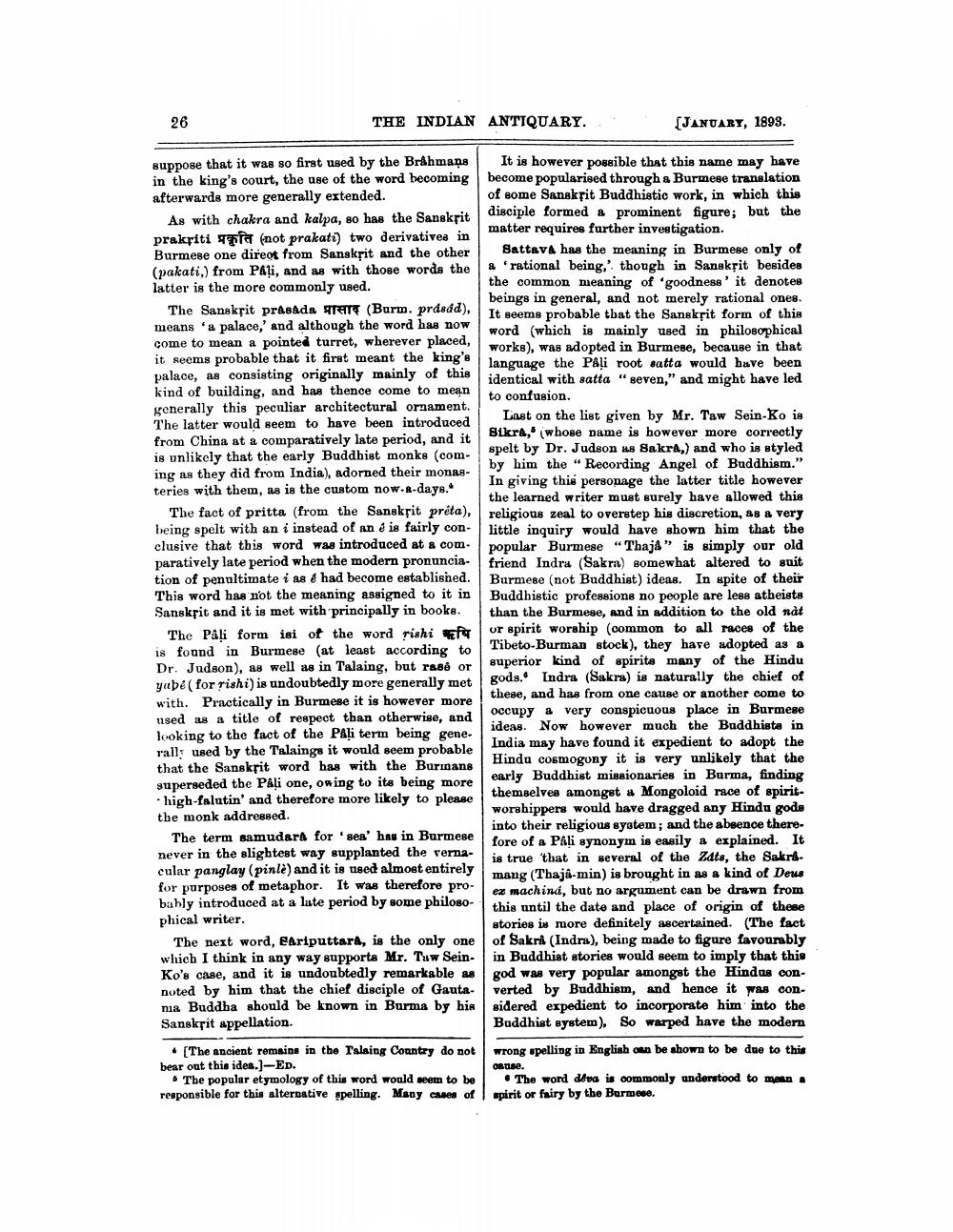________________
26
THE INDIAN ANTIQUARY.
suppose that it was so first used by the Brahmans in the king's court, the use of the word becoming afterwards more generally extended.
As with chakra and kalpa, so has the Sanskrit prakriti f (not prakati) two derivatives in Burmese one direct from Sanskrit and the other (pakati,) from Páli, and as with those words the latter is the more commonly used.
The Sanskrit prasada ger (Burm. prásád), means a palace,' and although the word has now come to mean a pointed turret, wherever placed, it seems probable that it first meant the king's palace, as consisting originally mainly of this kind of building, and has thence come to mean generally this peculiar architectural ornament. The latter would seem to have been introduced
from China at a comparatively late period, and it is unlikely that the early Buddhist monks (coming as they did from India), adorned their monasteries with them, as is the custom now-a-days.*
The fact of pritta (from the Sanskrit prêta), being spelt with an i instead of an é is fairly conclusive that this word was introduced at a com. paratively late period when the modern pronunciation of penultimate i as é had become established. This word has not the meaning assigned to it in Sanskrit and it is met with principally in books.
The Pâli form isi of the word rishi is found in Burmese (at least according to Dr. Judson), as well as in Talaing, but rasé or yube (for rishi) is undoubtedly more generally met with. Practically in Burmese it is however more used as a title of respect than otherwise, and looking to the fact of the Pâli term being gene. rally used by the Talaings it would seem probable that the Sanskrit word has with the Burmans superseded the Pâli one, owing to its being more high-falutin' and therefore more likely to please the monk addressed.
The term samudara for 'sea' has in Burmese never in the slightest way supplanted the vernacular panglay (pinle) and it is used almost entirely for purposes of metaphor. It was therefore probably introduced at a late period by some philosophical writer.
The next word, Eariputtara, is the only one which I think in any way supports Mr. Tuw SeinKo's case, and it is undoubtedly remarkable as noted by him that the chief disciple of Gautama Buddha should be known in Burma by his Sanskrit appellation.
(JANUARY, 1893.
It is however possible that this name may have become popularised through a Burmese translation of some Sanskrit Buddhistic work, in which this
disciple formed a prominent figure; but the matter requires further investigation.
Sattava has the meaning in Burmese only of a rational being,' though in Sanskrit besides the common meaning of 'goodness' it denotes beings in general, and not merely rational ones. It seems probable that the Sanskrit form of this word (which is mainly used in philosophical works), was adopted in Burmese, because in that language the Pâli root satta would have been identical with satta "seven," and might have led
to confusion.
Last on the list given by Mr. Taw Sein-Ko is Bikra, (whose name is however more correctly spelt by Dr. Judson as Sakra,) and who is styled by him the "Recording Angel of Buddhism." In giving this personage the latter title however the learned writer must surely have allowed this religious zeal to overstep his discretion, as a very little inquiry would have shown him that the popular Burmese "Thaja" is simply our old friend Indra (Sakra) somewhat altered to suit Burmese (not Buddhist) ideas. In spite of their Buddhistic professions no people are less atheists than the Burmese, and in addition to the old nat or spirit worship (common to all races of the Tibeto-Burman stock), they have adopted as a superior kind of spirits many of the Hindu gods. Indra (Sakra) is naturally the chief of these, and has from one cause or another come to occupy a very conspicuous place in Burmese ideas. Now however much the Buddhists in India may have found it expedient to adopt the Hindu cosmogony it is very unlikely that the early Buddhist missionaries in Burma, finding themselves amongst a Mongoloid race of spiritworshippers would have dragged any Hindu gods into their religious system; and the absence therefore of a Páli synonym is easily a explained. It is true that in several of the Zdts, the Sakra
mang (Thaja-min) is brought in as a kind of Deus ex machind, but no argument can be drawn from this until the date and place of origin of these stories is more definitely ascertained. (The fact of Sakrå (Indra), being made to figure favourably in Buddhist stories would seem to imply that this god was very popular amongst the Hindus converted by Buddhism, and hence it was considered expedient to incorporate him into the Buddhist system), So warped have the modern
• [The ancient remains in the Talaing Country do not wrong spelling in English can be shown to be due to this bear out this idea.]-ED.
osuse.
The popular etymology of this word would seem to be responsible for this alternative spelling. Many cases of
The word déva is commonly understood to mean a spirit or fairy by the Burmese.




